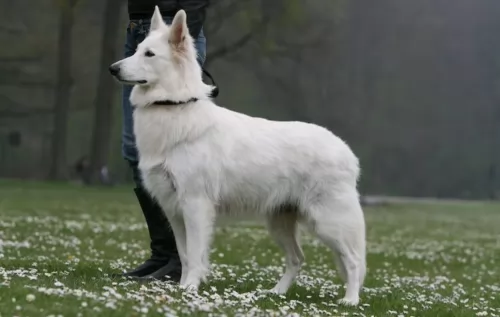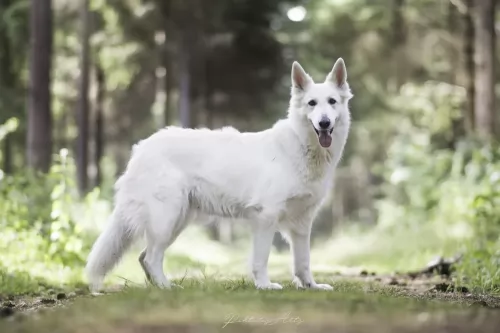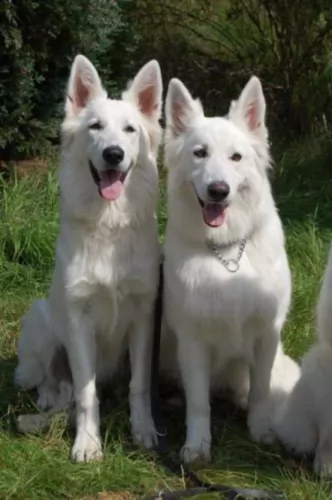 Petzlover
PetzloverBerger Blanc Suisse is originated from Switzerland but Pugnaces Britanniae is originated from United Kingdom. Berger Blanc Suisse may grow 9 cm / 3 inches shorter than Pugnaces Britanniae. Berger Blanc Suisse may weigh 70 kg / 154 pounds lesser than Pugnaces Britanniae. Berger Blanc Suisse may live 3 years less than Pugnaces Britanniae. Berger Blanc Suisse may have less litter size than Pugnaces Britanniae. Berger Blanc Suisse requires Moderate Maintenance. But Pugnaces Britanniae requires Low Maintenance
 The Berger Blanc Suisse is also referred to as the White Swiss Shepherd. The dog shares the same ancestry with the German Shepherd. The beautiful white dog from Switzerland, is closely related to the White Shepherd. Both breeds are descended from the German Shepherd breed.
The Berger Blanc Suisse is also referred to as the White Swiss Shepherd. The dog shares the same ancestry with the German Shepherd. The beautiful white dog from Switzerland, is closely related to the White Shepherd. Both breeds are descended from the German Shepherd breed.
It was in 1967 that a certain Agatha Burch brought a White German Shepherd with her to Switzerland and also importing a female white German Shepherd from the UK. It was these 2 dogs who were believed to be the first breeding dogs for the Berger Blanc Suisse. After a number of years, the breed was officially recognized in July 2011. In the USA and Canada, these White Shepherd dogs have been accepted as a distinct breed.
Pugnaces Britanniae is a dog which is now extinct. There isn't certainty surrounding the origins of the dog but it is thought they descended from dogs brought to Britain way back in the 6th century BC already.
These are ancient dogs, and when you do research you find references dating back to centuries ago. In fact when you read of the Roman conquest of Britain you read of huge dogs, which the Romans referred to as Pugnaces Britanniae.
It is believed that the English Mastiff descended from the ancient Alaunt and Pugnaces Britanniae and that the dog was used as a war dog.
 The medium-sized, well muscled Berger Blanc Suisse looks so much like the popular German Shepherd, and apart from its white coat, it has much the same physical standards. The females are about 55–61cm in height while the males are 60–66cm in height. The dogs dense, medium-length double coat tends to be slightly wavy but straight is more common. He has a long bushy tail.
The medium-sized, well muscled Berger Blanc Suisse looks so much like the popular German Shepherd, and apart from its white coat, it has much the same physical standards. The females are about 55–61cm in height while the males are 60–66cm in height. The dogs dense, medium-length double coat tends to be slightly wavy but straight is more common. He has a long bushy tail.
The Berger Blanc Suisse is somewhat longer than it is tall, but like the German Shepherd, it also has erect ears. In contrast to the white coat, the nose is black and the dog had dark, alert eyes.
This is an intelligent, confident dog and if you buy a puppy, of which the average litter size is 8, you will need to provide training and socialization to ensure he doesn't act totally independently and behave in a manner not pleasing to you. Once he is trained and socialized, he makes a wonderful pet and is social, playful and gentle. He is loyal and devoted to his human family, wanting to protect them. He is good around children and other pets in the home.
The Pugnaces Britanniae was a huge dog standing at roughly 67 to 75cm and weighing 52 to 110kg.
He was a heavily built dog, a Mastiff type dog that had a large head, broad muzzle with fairly loose skin around the mouth, brown eyes, a broad back and rump, muscular legs and floppy ears with a long tail. In fact the Mastiff, thought to have descended from the ancient Alaunt and Pugnaces Britanniae, gives you an idea of what the dog looked like. He no doubt has a short, smooth coat available in fawn, tan or brindle and with the black mask.
The Pugnaces Britannia was a naturally aggressive dog so it is to be expected that he wouldn’t automatically have been a good family dog, possibly being aggressive around children and other dogs. They were intelligent and were no doubt taught some simple commands.
They were also very territorial dogs, wanting to instinctively chase and attack unknown people and animals. They were strong minded, confident, loyal ad loving dogs towards their owners, being protective of them, wanting to please them.
 When you first set eyes on the Berger Blanc Suisse or White Shepherd, you can see that this is a strong, well-muscled, energetic dog, full of life and intelligent too. Add to that the fact that he is beautiful to look at.
When you first set eyes on the Berger Blanc Suisse or White Shepherd, you can see that this is a strong, well-muscled, energetic dog, full of life and intelligent too. Add to that the fact that he is beautiful to look at.
Your Berger Blanc Suisse dog is gentle and loyal with his own human family and will be somewhat wary of strangers. This dog is balanced, good-natured, friendly and affectionate and he just loves spending time with his family, being a good watch dog as well. He’s got so much going for him – good looks, a great personality, he is loyal, loving, strong, healthy and he’ll make one hang of a pet.
The Pugnaces Britanniae may well have been a large dog and quite imposing to look at but he was in all likelihood a good-natured pet who got on well with his family members, being loyal and loving if brought up correctly.
Long ago dog training and socialization didn’t exist but a large dog like this would have to be socialized and trained to become obedient and an amicable all-rounder.
 Your White Swiss Shepherd is a healthy, energetic, strong dog, but even so when you find him lethargic and listless, you want to get him to the vet for a check-up. It is always a good idea to be alert to common dog illnesses so that you know what to look out for in your dog.
Your White Swiss Shepherd is a healthy, energetic, strong dog, but even so when you find him lethargic and listless, you want to get him to the vet for a check-up. It is always a good idea to be alert to common dog illnesses so that you know what to look out for in your dog.
A common problem with dogs. The dog becomes restless and the abdomen is often enlarged. Get your dog to the doctor immediately.
This is a developmental defect of the hip and elbow joints and you’ll notice your pet battling to rise again after lying down.
This is a disease of the nervous system where the hind legs and feet drag. Sometimes the dog loses control over the bladder.
The Pugnaces Britanniae could live to 10, 11 or 12 years of age with good care. Large Mastiff type dogs like this would have had to watch out for common canine diseases such as hip dysplasia, cancer and bloat.
In those days, no screening tests were available for health problems like this. Gastric dilatation volvulus or bloat is a common health issue with large, deep chested dogs where the stomach fills with gas and the stomach twists. Its a life threatening disease.
Canine heart disease is another serious health issue with these mastiff type dogs. Early stages with heart disease show there may well be no symptoms at all. However, as the heart disease progresses towards congestive heart failure, the dog will have symptoms such as fatigue, difficulty with breathing, weight loss, a distended abdomen and coughing.
A dog with symptoms like this would have to see a vet immediately.
 Apart from your Berger Blanc Suisse puppy need an excellent quality puppy food 4 times a day, as he gets older you will need to adjust his food to suit his high energy needs. Once your pet reaches a year of age you will know whether he requires one or two helpings of food a day. You can feed him a top quality commercial manufactured food or you can make your own home-made food for him which includes meat, rice and vegetables.
Apart from your Berger Blanc Suisse puppy need an excellent quality puppy food 4 times a day, as he gets older you will need to adjust his food to suit his high energy needs. Once your pet reaches a year of age you will know whether he requires one or two helpings of food a day. You can feed him a top quality commercial manufactured food or you can make your own home-made food for him which includes meat, rice and vegetables.
You want to make 100% sure he is getting the correct dosage of minerals and vitamins to ensure good health. To keep his eyes bright and his nose wet, include some raw meat into his diet as well. Make sure that he always has access to fresh, cool water.
Remember that your Berger Blanc Suisse is a working dog and he will need plenty of exercise. Apart from taking him on long walks, you can throw balls for him, buy rope toys for him and give him some rough and tumble. He is an intelligent breed and he will require some games that give him mental stimulation too.
Check regularly for fleas and ticks. You’ll pick this up with brushing his beautiful coat. Frequent brushing will help keep your dog clean and also remove all those loose hairs. Your White Swiss Shepherd Dog is a moderate, but constant shedder as well as being a heavy seasonal shedder so you will need to give him a good brush at least twice a week.
The diets of ancient dogs were different to what they are today, as in those days there were no commercially manufactured dog foods. Dog owners in all likelihood tossed scraps to them which included starch.
Today a large dog such as the extinct Pugnaces Britannia would have no doubt been fed a high quality kibble from a leading brand and packed with minerals and vitamins specially formulated for a large dog breed.
Homemade food is also important, but not any kind of food – it has to be food which doesn’t upset the dog’s digestive system. Simple but nutritious food such as boiled chicken, brown rice or pasta, sweet potatoes, carrots and spinach is ideal for a dog, and when it is chopped up can be added twice a week to the dry kibble for a tasty, healthy treat.
Raw meat added in occasionally is also hugely beneficial. No dog should ever be without fresh, cool water constantly available.
As a short haired dog, the Pugnaces Britanniae would have required a brushing twice a week to rid the dog of loose hairs. Maybe in those days they didn’t check their dogs over to see that all was well, but today you would need to check the inside of the ears. If the insides were red, it could be a sign of an ear infection brought on by dampness, excess wax and dirt.
The eyes would need to be checked for discharge and the teeth checked a well. One rotten tooth can cause a lot of havoc. The nails of the dog would have had to be checked and clipped as well.
As a war dog, the Pugnaces Britanniae would have been fit. He is a big dog and while they require exercise such as walks and hide-and-seek type of games, he isn’t the kind of dog that would go running with you on a jog, as large, heavy dogs can overheat easily.